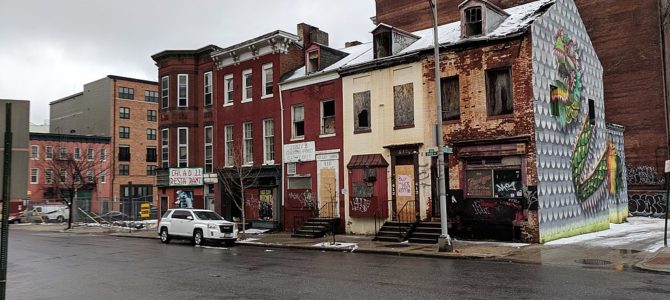
It only took seven months after my family and I moved to Baltimore in January for us to move out. We’re hardly the only ones leaving — in 2020, Baltimore lost more residents than did any other major U.S. city. At one point, my Brazilian husband remarked, “I thought America was a developed country.”
His observation is particularly telling because, before coming to Baltimore, we spent five years living abroad in two of the most dangerous places in the world – Brazil and South Africa. In many ways, life in those countries was easier than life in Charm City.
The residents of Baltimore pay some of the highest taxes in the country for some of the worst public services. Crime is a constant threat, even though the neighborhood where we lived is usually labeled “gentrifying.” A professional exterminator warned us never to buy second-hand furniture due to the prevalence of bed bugs. Everyone on our block kept a cat – often two or three – to combat the rodents.
After we fled to the suburbs, I was left pondering why life in Brazil and South Africa was easier — particularly South Africa, which has many parallels with America because it reached a fairly high level of development, but ruinous government policies are now driving it backward. Public services in South Africa have been so deeply riddled with corruption and mismanagement for so long, citizens have learned to do without or developed workarounds, something the residents of Baltimore haven’t learned yet.
Ballooning Crime and Ill-Equipped Police
Baltimore and South Africa are both infamous for high crime rates. In South Africa, police are helpless and incompetent. For example, a few years ago, the police cybercrimes unit had to drop hundreds of cases because they forgot to pay for their software licenses. They can also be corrupt; South Africans told me stories about police officers demanding bribes to do routine tasks like writing up a car accident report.
As a result, everyone from the lower middle class and upward pays for private security. In the small city where we lived, a local security firm patrolled the streets like a private police force. Even the police sometimes hire private security to guard their precincts.
In Baltimore, the number of reported homicides reached a record high in 2015 after the city erupted in riots at the death of Freddie Gray in police custody. In the wake of the riots, police became less visible on the streets, and they have not returned. The Baltimore police department operates with around 400 unfilled vacancies. The city’s homicide rate has yet to fall to pre-2015 levels.
While the current condition and recent history of police in Baltimore and South Africa are different, the outcome is the same: criminals run rampant. Neighborhoods and businesses in Baltimore appear to be gradually moving towards the South African solution: private security.
South Africans do not mess around with their safety. In addition to hiring private security, they protect their houses with things like tall electric fences, CCTV, guard dogs, and motion sensors. People in Baltimore are still naïve in that regard. I followed several online groups for city residents. Many of the posts were by people whose houses had just been burgled, who often shared images from their security cameras. I was amazed to note most of them did not even have a fence in their backyards.
Decrepit Public Services
I also found myself surprised that people in Baltimore – and Americans in general – still rely heavily on the U.S. Postal Service. We sometimes only saw our mailman once a week and he often brought us other people’s mail. In South Africa, the postal service has been a disaster for so long that many people have stopped sending mail at all.
Other public services in South Africa were just as bad. Usually, the poor are left with scraps, while those with money usually pay twice: once in taxes for worthless public services and then for a private solution that actually works.
Electricity is very expensive in South Africa because the state utility Eskom is corrupt and mismanaged. Millions of people live without electricity, while those who can afford to pay Eskom’s rates also have to buy generators or solar panels as a backup for the regular power outages.
South Africa’s constitution includes the right to water, but this right is violated all over their country every day. The tap water in the city where we lived was unsafe, so we bought large containers from one of the many local “water shops.” Other people take it a step further by drilling boreholes and installing their own filtration systems. In one city, a group of citizens took over running their local water and sewage plants because they were so badly mismanaged.
Community solidarity like this was common in South Africa, and made the difficulties manageable. South Africans organize private groups to do things like fill potholes, repair or repaint road signs, and collect garbage. They form neighborhood watch groups that partner with professional private security firms.
There are certainly significant tensions between different ethnic groups in South Africa, but within individual groups, I observed a very strong culture of looking out for one another. We lived in a college town, and students in their late teens and early twenties regularly helped us with things like home repairs or running errands. This was already their normal way of life. In a difficult country like South Africa, “going it alone” is not an option.
In Baltimore online discussion groups, people often posted comments like “we have to work together” or “we should stand up.” I agree, but until they turn those words turn into offline actions, life in their city will not improve much.
Baltimore is a particularly bad case. But in many other American cities, crime rates are rising and the quality of public services is dropping. If we have any hope of reversing the decay, we should take note and act now.









